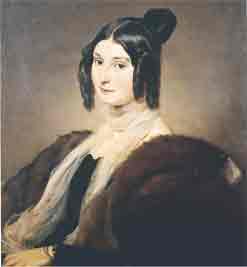The 150th anniversary of Italy's unification is not only
an opportunity to reflect on the last century and a half of our country's
history, it is also a time to rediscover an era, settings and repertoires
which are rarely explored (due to time and space) within the traditional
itineraries of concerts programming and academic programs.
In fact, in
the nineteenth century, there is a parallel history to the one made of
names of leaders and patriots, of dates of battles and treaties, of great
artists and heroes: a social history made in the web of the many circles
and salons of culture, disseminated in all Europe and therefore also in
Italy from the end of the eighteenth century and on, from the North to the
South, without distinction, where discussions, debates, political analysis
and talks of the 'Italian problem' were entwined with literature, painting
and music.
Salons where a place where knowledge was shared and created,
where the nation's conscience was made, giving life to a form of
integrated art which came to be both a stimulus and a mirror of the
extraordinary period.
A salon, in the nineteenth century, was much more
than what we think today: the salon was like a large newspaper, where
every event of the day (commentaries, politics, culture, painting,
literature and music) was analysed, discussed, and debated. And often this
was done together with the protagonists themselves: at the Maffei home met
Massimo D'Azeglio and Giuseppe Verdi, Tommaso Grossi and Franz Liszt,
Alessandro Manzoni and Francesco Hayez, only to name a few. And it was
inevitable that these discussions among people of various disciplines
stimulated the sharing of ideas and styles in a communion of true
intentions whose unique objective was the fate of Italy.
It was inevitable that ideology linked to the risorgimento
transpired even if not voluntarily in the works of all those who came
together in these venues. We only need to think about the works of Verdi
composed between 1842 and 1849 (impossible to forget Nabucco, the Battle
of Legnano, Ernani, The Lombards on the First Crusade) whose chorus is
influenced by the combative rhythm of Berchet's ballads; or of Manzoni's
writings, and Giuseppe Giusti's Sant'Ambrogio, these people all meeting in
countess Clara Maffei's salon. And if in her salon patriots gathered and
uprisings were organized, in Giulia Falletti Colbert's Torino palazzo
lived for a while Silvio Pellico back from the Spielberg prison, and young
Cavour; in Emilia Toscanelli Peruzzi's salon in Florence met Guerrazzi and
De Amicis and the new Italians were a subject of discussion as well as
women, and in Lucia De Thomasis' Naples salon met Poerio and Settembrini
and the poetesse sebezie with their poetry giving strength to the
cultural history of the great southern capital.
Venues of cultural
interaction and integration, the salons had all one thing in common: they
were organized by women. Women of culture and great inquisitiveness whom
society then did not allow in public associations or cafés. They created
in their home an even broader world, interdisciplinary and varied in
comparison to the limited and specialized circles (for males only) and
this way contributed with the same weight and political strength to the
unification.
These salons were regularly attended by columnists who
wrote about their guests and discussions, diversity and life; and these
events taking place in salons are being rediscovered through conversations
and music.


In a series of cultural events ('conversations with
music' organized last February at the Museo del Risorgimento di Bologna)
the music association A.M.I.C.I. di Boccherini is planning in the fall the
history of music and conversations in salons, interlaced with musicology,
readings of diaries from that period, music by well-known and not so
well-known authors, from Verdi to Bazzini, from Sperati to Donizetti, from
Liszt to Dohler, with a four-hand piano, singing, violin, double bass and
harp executed by young and skilful interpreters.
Finally, the
celebrations of our 150th anniversary beyond the inevitable dimension of
'commemoration', will, thanks to music and culture, bring light to the
rediscovery of this history with a feminine touch which has always been
neglected in favour of more sensational and startling events.